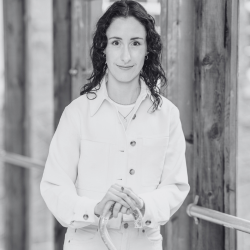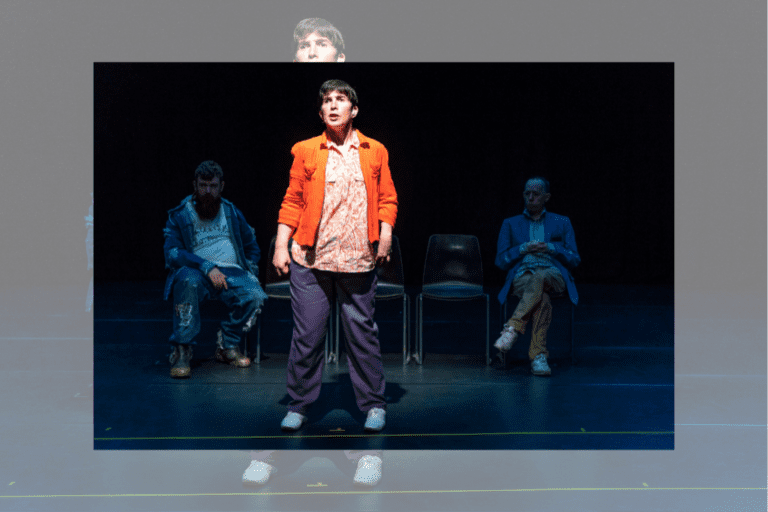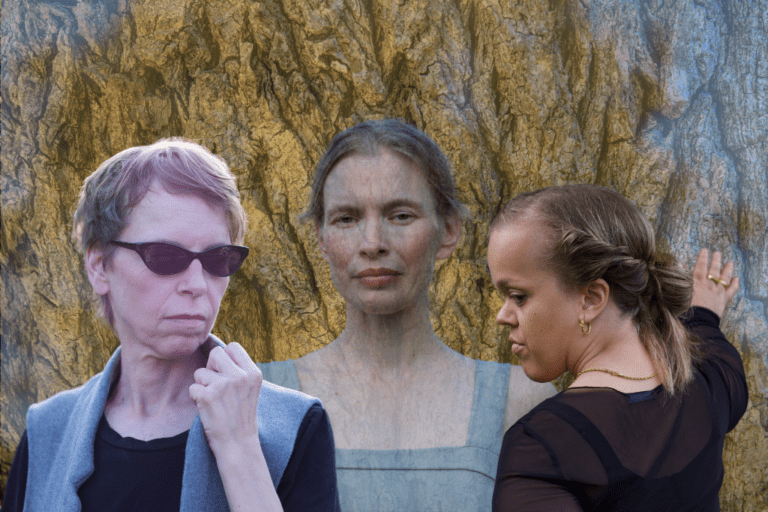REVIEW: Access Me at Aki Studio/Boys in Chairs Collective
The first time I went to a queer event in Toronto (Cherry Bomb, in the former ROUND venue in Kensington Market), I was greeted by a steep flight of stairs to get into the party. As a physically disabled lesbian, I’m never exactly in the mood to flirt when I’m winded after forcing my body into an inaccessible space.
There’s a certain irony that the queer community prides itself on its inclusivity, and yet there is often a failure to imagine that disabled people belong in queer community, too. That failure to imagine us extends to the way we often cannot physically enter queer spaces, and also a failure to imagine us as potential friends, sexual partners, or lovers. It’s an irony that the Boys in Chairs Collective explore in their new work Access Me, onstage in a delightfully accessible and intimate staging in the Aki Studio at Daniels Spectrum.
Access Me makes no apologies for access needs, and theatricalizes access. Performer and creator Andrew Gurza informs us at the top of the show that this piece runs on “crip time,” and that we’re free to come and go as we please, and “friend-tendant” Jordan Campbell steps in throughout the show to provide personal support during costume and set changes. In a world where independence is lionized, and where disabled people are up against the erroneous cultural myth that it’s possible to “overcome” your disability if you work hard enough, it’s lovely to see the idea of interdependence centered throughout this piece.
That ethos of care extends to the audience. As I entered the theatre and took in the space, draped by set designer Michelle Tracey in enormous red velvet curtains on each side of the in-the-round playing space, performer/creator Frank Hull sidled up alongside me, asking if there was any seat in particular I’d prefer before helping me get settled in one of the accessible seating options. Performers and creators Ken Harrower and Gurza also stopped by the pre-show, greeting everyone in my section and establishing right away that the fourth wall stays broken for the length of this piece.
These pre-show interactions help to settle us into the rhythm and conventions of the show. For lovers of audience participation, you can get your fill at Access Me — Campbell, our aforementioned “friend-tendant,” also offers VIP badges to audience members as they enter the space, which indicate to the performers that you’re open to audience interaction. On the back of each badge is a very personal question — that is, the kind of question any disabled person is used to hearing strangers ask us when we’re just minding our own business on the TTC.
Once we’re introduced to Gurza (“the disabled dork with a big dick”), Hull (“the romantic”), and Harrower (who “loves feet”), the performers select audience members to read the question on their badge out loud. At the performance I attended, we explored queries such as “how do you use the bathroom?”, “do you want to get married?”, and “are you proud to be gay and disabled?”
Though our audience participants and their questions were selected randomly, this question about pride in being gay and disabled is in fact one of the central themes of Access Me. In a series of personal vignettes, Gurza, Hull, and Harrower explore the tension between their disabled identities and their queerness, with horny romps through adolescence, interactions with the police, and even Grindr (Gurza cruises for a hookup in real-time thanks to some inventive projections on two screens at either end of the space, designed by Julia Howman).
Though Access Me invokes a lot of direct address monologues, as the show progresses, the Boys in Chairs experiment with other theatrical conventions. I was particularly moved seeing Hull, one of the country’s best professional wheelchair dancers, in an intimate pas de deux with Harrower.
Director/creator Jonathan Seinen, associate director/creator Brian Postalian and dramaturg/creator Debbie Patterson have shaped Access Me into an evening that unfolds like a night at the club (or at least my platonic ideal of an accessible night out). At first, you observe from a distance. Then, you get your feet wet — a moment of audience participation that reveals a set design surprise reminded me of how community care is part of this piece’s DNA. Access Me is part tender eulogy for the people we’ve shared intimate moments with as well as for the queer spaces Toronto has lost since the 1990s and part irreverent night out. By the end of the show, which erupts into a raucous dance party, it’s impossible not to join in yourself — but more importantly, it’s impossible not to feel welcome.
Access Me runs at the Aki Studio until June 24. Tickets are available here.
Intermission reviews are independent and unrelated to Intermission’s partnered content. Learn more about Intermission’s partnership model here.













Comments